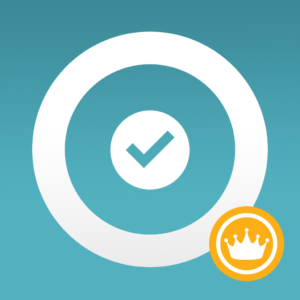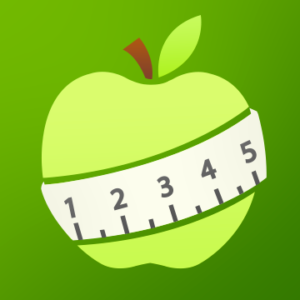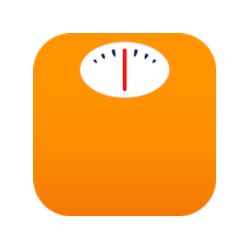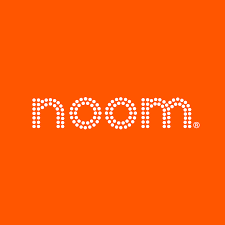Calorie counting apps are applications for your smart device that can log your food intake. They’re very similar to old-fashioned food diaries, except digital. If you want to lose weight, counting calories is essential. Weight loss relies on creating a calorie deficit, which you can’t do unless you’re counting your calories.
Below, you’ll find our review of the top calorie counting apps available.
Rankings
1. MyFitnessPal

MyFitnessPal is our favorite app because it is free, accurate, and easy to use. While it does have a premium version, you won’t need it to track your meals and keep up with your calories.
This app comes pre-loaded with tons of foods and is continually adding more. Most restaurant meals are included on the app as well. For these reasons, it is our #1 pick.
2. Control My Weight

This app is more focused on the motivational side of things. It tracks your calories as well as your macronutrients. It also comes with a barcode scanner, which can use to add foods quickly.
Furthermore, this app will make suggestions based on your eating habits by suggesting which foods to add and discard.
3. Lifesum

Out of all those we reviewed, this was one of the easiest to use. It is very flexible and comes with motivational components to help you stay on track.
A unique feature is this app’s Kickstarter program, which gives you three-weeks’ worth of meals and shopping lists for a meager price.
4. SparkPeople Calorie Tracker
![]()
This app comes with all the usual features you’d expect: a barcode scanner, food database, meal planner, exercise journal, etc.
However, it also comes with a support network of other users, health professionals, and personal trainers. If you thrive in the community, this is a great app.
5. MyNetDiary

This is another app with a reliable support network. It comes with a barcode scanner as well as a massive food database.
There is also an extensive community where fellow users share their personal stories, tips, and recipes. For those who need community, this is another solid choice.
6. Lose It!

Lose It! provides you with everything you need to lose weight. It has a food diary and exercises log, as well as connectivity to fitness watches and pedometers.
It will provide you with personalized suggestions based on your current weight and goals. The food database it comes with is pervasive.
7. Carb Manager

This app is technically made for the keto diet, but anyone who needs to count their calories can use it. It comes with various tools to help you track your net carbohydrates, keep up with your nutrient intake, and consume a certain amount of fat each day.
It also comes with many keto-friendly recipes.
8. Noom

Noom is an excellent weight loss app. However, it doesn’t let you count your calories directly, which is why we rated it lower than most.
It does provide you with the tools you need to change your eating patterns, though, as well as an interactive coach to answer your questions.
9. FatSecret

FatSecret is primarily a calorie counter. It includes a food diary, nutrition database, weight chart, journal, recipes, and other features. Like you would expect, it also comes with a barcode scanner.
This app also offers challenges, where you can participate in daily dietary challenges. It also features tons of information and tips.
10. HealthyOut

If you eat out often, this app may be helpful. It features the menus of many of the most popular websites, as well as the nutrition information for each menu item.
It also allows you to set filters for restaurants and menu items, so you can find exactly what you’re looking for.
How We Ranked
In this article, we just focused on how well each app was at counting calories. Was it easy to add foods? Did the app come with an extensive and accurate database? Was there a barcode scanner that quickly allowed users to add foods? Were meals from restaurants included, or was it easy to add the nutrition information yourself from the restaurant’s nutrition guidelines?
All of the apps in our rankings section did a great job of helping users track calories. Most include a barcode scanner as well as an extensive database. Many are very easy to use and straightforward. Those that weren’t didn’t make it onto our list.
Secondly, we considered the app’s value. Some apps were expensive, while others were completely free. We didn’t find the app’s cost directly when ranking, but we did consider whether or not the more costly apps provided extra features and value. If a free app provided the same features as the paid app, it ranked higher.
Because of this, many apps on this list are free or cost only a few dollars. Unless a paid app was revolutionary, like Noom, it typically didn’t provide enough extra features to offset the additional cost. This is also why MyFitnessPal ranked so high. It is free and provides practically everything you need to track all of the calories you eat accurately.
Thirdly, we also considered the helpful extras the app came with. While we did focus mostly on the calorie tracking portion of each app, we also bumped up the apps that came with extra features, like recipes, nutrient tracking, and exercise journals. While you don’t need these to track calories, they’re beneficial to a wide range of people and prevent you from needing to download multiple apps to track your fitness.
Once again, this is one reason why MyFitnessPal was our top pick.
Finally, we considered how accurate each app was. Most apps come with a built-in database of foods, making it easy to add foods to your diary quickly. However, not all apps had accurate databases. Some relied exclusively on the information other users had put in, which isn’t always accurate. Others went to government websites for nutrition information. This is usually much more accurate than crowdsourcing information.
Benefits
Calorie counting apps can reduce your chance of developing diabetes. Being overweight is very connected to your risk of developing pre-diabetes and type 2 diabetes. Each year, more and more adults are diagnosed with diabetes. In fact, according to the CDC, one in three adults in the United States have pre-diabetes, though many are not diagnosed (1).
Pre-diabetes means that your cells are starting to respond abnormally to insulin. Usually, this develops into type 2 diabetes unless you make serious lifestyle changes.
Those who are overweight have a 7.37% higher chance of being diagnosed with diabetes according to one study (2).
Using a calorie counting app to reduce your weight can also go far to reducing your risk for diabetes. Because this is a severe and ever-growing disease, it is imperative to limit your chances of getting it. In many cases, diabetes is entirely preventable with lifestyle changes. The earlier you start, the better.
Calorie counting apps can lower your blood pressure. Blood pressure is another health factor that is directly tied to your weight. Blood pressure is significantly linked to insulin as well, which is also affected by your weight (3).
High blood pressure is associated with all sorts of adverse outcomes. It can cause your arteries to harden and thicken, which can lead to a heart attack after an extended period. It can also create an aneurysm, which is when the increased blood pressure weakens your blood vessels and causes them to bulge.
Luckily, if you have high blood pressure, it doesn’t have to stay high forever. Lifestyle changes like weight loss can affect your blood pressure directly, causing it to return to the normal range very quickly. Counting your calories can help you lose weight and lower your overall blood pressure.
Calorie counting apps can increase your mobility. If you’re currently overweight, your movement might be affected. Carrying around lots of extra fat can wear down your joints and spine. If you’re overweight, you probably can’t move as well as you once could. This can make losing weight difficult, since you may not be able to exercise as much or as well as you’d like to. This lack of mobility can also reduce your quality of life, as you may not be able to do things as well as you once could (4).
Because of this lack of mobility, counting calories becomes even more critical. Losing weight relies on a calorie deficit, which means you burn more calories than you take in. If you’re having difficulties getting up and moving, it is even more critical to track the calories you’re consuming to ensure that you’re staying at a caloric deficit level.
A calorie counting app can help you with this by making it easy to track all your meals and snacks.
Calorie counting apps can reduce your overall mortality rate. One study found that trying to lose weight by counting calories and exercising was associated with a lower mortality weight, even if the participants had failed to lose significant amounts of weight (5). In other words, counting your calories and trying to lose weight can be beneficial to your health, even if you end up not losing very much weight in the end.
These benefits became apparent almost immediately, so if you start counting your calories today, you may receive benefits right away.
Of course, losing weight is also helpful. However, this study found that overall mortality decreased only when the weight loss was intentional. If participants lost weight unintentionally, their chancing of dying did not fall.
This shows us that trying to lose weight may be more critical than actually losing weight. This is likely because trying to lose weight often comes with various lifestyle changes, such as eating healthier foods and exercising more. It was these lifestyle changes that decrease your mortality rate, not losing the weight itself.
Because losing weight is achieved by creating a calorie deficit, you must keep up with your calorie intake. This can be done quickly through a calorie counting app, which will do all the math for you. You just need to add all the different foods you eat.
Calorie counting apps can improve your mental health. Even if you don’t lose much weight, studies have found that attempting to lose weight can improve your perceived health and social wellbeing (6). It is the lifestyle changes that come with counting calories that are vital for your social health, not necessarily the actual weight loss. Furthermore, choosing healthier meal options through the use of a calorie counting app and increasing the amount of exercise you do can improve your overall health, as we have already discussed.
Therefore, just downloading and using a calorie counting app can improve your overall sense of wellbeing and social wellbeing, which includes things like confidence. In these cases, we recommend focusing on the journey of losing weight and getting healthier, instead of obsessing over the scale. Studies have shown us that the lifestyle changes you make to lose weight are far more critical than the number on the scale.
Calorie counting apps are flexible. Compared to other methods of losing weight, calorie counting is very straightforward and manageable. Many people will have a maximum number of calories they are supposed to consume each day. Sometimes, users come up with their numbers themselves, though at other times, they may be suggested by the app itself. However, the foods you eat don’t matter. You can eat whatever you want as long as you stay within a specific calorie range. Plus, even if you go over your calories, many users report negotiating with themselves to make up for it (7). You may decide to walk for an extra ten minutes, for example.
Over time, this often causes users to make healthier decisions. You must decide whether that slice of cake is worth the calories, or if you’d rather have something healthier instead.
Side Effects
Calorie counting apps can encourage eating disorders. These apps focus entirely on what you eat. For many people, the act of counting calories can make them more mindful about what they put in their bodies and encourage them to cut back to healthy calorie intake. However, for other people, the emphasis on calories can cause anxiety and exuberate eating disorders. The average person is not going to develop an eating disorder just because they started using a calorie counting app. However, those who are at risk or already have an eating disorder can find their symptoms exuberated by these apps (8).
One study looked at college students who reported their use of tracking technology. Those who reported using caloric trackers also had higher levels of unhealthy concern about what they ate and higher numbers of restrictions on their diet. Furthermore, the study found that they could predict who had an eating disorder based on their response to the survey (9).
However, this doesn’t necessarily mean that the eating disorder was caused by the use of tracking apps. It is more likely that those with eating disorders were more likely to use the apps in the first place.
Bottom line: calorie counting apps are helpful to the majority of the population. However, they can cause issues for those who are prone to eating disorders or who already have an eating disorder. Use these apps to help you track your food, but in a healthy and balanced manner.
Calorie counting apps are not typically based on science. There is a particular psychological method often used in the health profession to change someone’s health-related behaviors, like how many calories they eat, for example. However, an evaluation of ten of the most popular apps found that many apps did not use health behavior theory in their design (10). Many apps did not use scientifically sound principles at all.
As you can imagine, this means that many apps may not help their users change their behaviors. While they still might work, they could work better if they utilized these scientific principles.
Calorie counting apps aren’t liked by everyone. There are many different ways to lose weight. Counting calories is one of the simpler, more straightforward ways. However, there are other possible approaches you could use. Not everyone likes the calorie counting approach, and many people find it challenging to maintain motivation to count their meals each day.
One study found that some who sought to lose weight would rather have a motivational app, instead of one that focuses on calorie counting (11).
These apps aren’t for everyone, and that is okay. Get the app that is going to work best for you.
Calorie counting apps might not be secure. In general, calorie counting apps are not as safe as you might hope. One study reviewed 43 of the most popular health and fitness apps on the market (12). It looked that each app’s use of private information as well as how secure each app was to hacking. In all, 74% of free apps and 60% of paid apps had a privacy policy. This means that a surprisingly large chunk of apps did not protect their user’s private information at all.
Furthermore, only half of the paid apps and 25% of free apps made it clear that their privacy policy did not count on third-party links within their app. Very few apps notified their users if they were about to share information with a third source, like a survey taking website, for instance.
Some apps asked their users to take health-related surveys. Sometimes, these surveys were not done by the apps themselves, however, and were instead by third-party sources. Of course, the app’s privacy policy does not cover these sources. Therefore, all of the information could have been sold and used for advertising purposes.
Furthermore, even apps that protected users with a privacy policy often did not use encryption. This means that the information could have been easily accessed by those with the right skills. Many of these apps sent information between the user’s phone and the company’s servers as well, putting the data at an even higher risk.
Recommended Usage
Most calorie counting apps rely on you to input everything you eat and drink into the app. This ensures that the app can correctly estimate how many calories you’ve consumed, which helps you stay on track. If you don’t input all of your food, the data in the app will be incorrect. This is a significant reason why many apps make it very easy for you to input your food with the help of barcode scanners and vast databases of food.
Many apps also can track your exercise routine. If this is the case with the app you purchase, it is crucial to input this information as well. Often, how much you exercise will affect the number of calories you should eat. If you don’t track this information, your calories will be slightly off.
Of course, there are some reasons why you may not need to track everything you eat. If you opt to have “cheat days,” it might be better not to track what you’re eating during these times. Furthermore, if you’re prone to eating disorders, you may want to limit your tracking to certain days.
Generally speaking, you will not have to use these apps forever to lose weight. Once you get a feel for how much you should eat every day, you will not need to track every meal, especially if you’re eating the same foods again and again. If you eat the same amount thing for breakfast every day, you could reasonably not track it every morning.
FAQ
What is the best app for counting calories? Out of all the apps we looked at, we liked MyFitnessPal the most. This app is straightforward to use, but also comes with many advanced features, like macronutrient tracking. It also can track certain micronutrients and your daily exercises. It can provide you with a set calorie goal for each day, though you can change this goal if you want.
Plus, at its basic level, it is entirely free. There is a premium version that comes with a few extra features, but you will generally not need this if you’re just trying to lose weight. If you do end up opting to pay for the premium version, it is very inexpensive as well.
What is the easiest way to count calories? By far, the easiest way to count calories is to use a calorie-counting app. You can do it by hand, but it will take much longer than just plugging in the information into the app. Apps will also do all the math for you and keep up with your goals, which takes a lot off of your shoulders. Most apps have a food database as well, preventing you from needing to scrounge around on the internet to figure out how much protein is in that ground beef you just bought.
Do calorie counting apps tell you how much you should eat each day? Most apps can estimate how many calories you should eat based on your current weight and desired weight. Many follow the basic principle that you should consume 2,000 calories a day to maintain your weight. Depending on how much you want to lose or gain, the app will adjust this figure. Apps that allow you to input your exercise will also take that into account in most cases.
However, it is essential to remember that this is just an estimate. Based on how much weight you lose over the first few weeks, you may need to adjust your caloric intake. Some apps do this for you, but not all.
Plus, if you’re eating more than 2,000 calories a day now and are trying to lose weight, jumping down to a much lower caloric intake can be nearly impossible and not necessary. It may be in your best interest to track how many calories you eat for a day or two just to get an idea of where you’re at currently, and then use that information to tweak your goal calorie intake.
Also, remember to take into account facts that the calorie-counting apps might not be able to, such as individual health conditions that might affect how much you should eat. Someone with type 2 diabetes may need a lower carbohydrate intake than the app suggests. Those who are pregnant or breastfeeding will need more calories than most, even if they are trying to maintain or lose weight.
How do I know my calorie intake? The easiest way to figure out how many calories you’re consuming is to download and use a calorie counting app. Just eat like you usually would and input all of your food into this app. Keep doing this for a week or at least a few days to get an average of the number of calories you consume each day. Often, we consume different quantities of calories on different days, depending on what is going on. Because of this, it is usually best to do it for a week or so.
Is there an app that will tell me how many calories I need to eat to lose weight? Yes. Many calorie counting apps will give you an estimate regarding how many calories you should consume each day to lose weight.
They all do this differently, but most go off the assumption that you’re currently eating 2,000 calories a day. This isn’t always true, and therefore you may need to adjust the count if you’re now consuming more or less than 2,000 calories.
Many will also use information like your activity level and goal weight when deciding on how many calories you should eat. However, this isn’t always the case, so consider adjusting the count yourself if your app doesn’t do these things.
Is there a free app to count calories? Yes. There are quite a few free apps that you can use to count calories. Our favorite was MyFitnessPal. This app is free to download, and there is a free version as well as a premium version. The free version comes with all the features you need to track your calories, including a barcode scanning option, food database, goal personalization, unlimited food tracking, and more. The vast majority of users will not need the premium version, which allows you to do things like set a particularly calorie goal for each meal.
What is the most straightforward calorie counter app? We found MyFitnessPal quite quickly. To use it, you simply click the diary option at the bottom of the app and then the plus button to add food to each meal. You can type in the nutrient information manually or search their database of food, which has practically everything.
With that said, there are a few that are even easier than MyFitnessPal if you need something extremely streamlined. Lifesum is extremely easy to use and very minimalistic. It is probably best for those who have little technology experience or find other apps confusing and cluttered.
Can calorie counting apps count calories for homemade foods? Absolutely. Many apps give you the option to input a full recipe and then divide it up by serving. In this way, it can figure out how many calories the whole method is and then divide it up to the number of calories you’re using. If you’re using a recipe from the internet, many can import those recipes with a few clicks.
Will calorie counting apps tell me what to eat? Some of them do provide meal plans or food suggestions. Lifesum provides a paid Kickstarter program for those new to weight loss, which includes meal plans and recipes. Noom doesn’t offer meal plans specifically but will give you a rating for the food you’re eating and make suggestions on what you should eat. If you need a little bit more hand-holding, we do suggest using one of these apps.
Will a calorie counting app help me lose 20 pounds in 8 weeks? It depends on what you set your calorie intake at and your current weight. If you currently weigh more, it’ll be easier to lose more weight over a shorter time. However, those who are already close to a healthy BMI are going to have a harder time losing 20 pounds in only eight weeks.
You also have to take into account any health conditions you might have and whether or not it is healthy for you to be losing weight that fast. The general suggestion is that you should only lose 1 pound to 1.5 pounds a week. If you’re going to attempt to lose 20 pounds in only eight weeks, you should work closely with your doctor.
In short, a calorie counting app can help you lose that much weight very quickly. However, a lot of that depends on you, not the app itself. Most apps do not suggest a calorie intake low enough to help you lose that much weight, so you will need to adjust your calorie intake accordingly.
Is there a better calorie counting app than MyFitnessPal? We looked at many different apps in our rankings section. However, the best one we found by far was MyFitnessPal. We particularly like that the basic version of this app is free and comes with all the features the average user will need. Most users will be able to get away with using the app for free, though it does have a premium option for those who need a little extra oomph.
MyFitnessPal can keep up with your calorie intake as well as the various nutrients and minerals you eat. It doesn’t have meal plans outright but will highlight the best food choices you make so you can select them again. It can also let you know how many calories you should consume, though you can personalize these goals as well.
Do counting calories apps work? Yes. If you use them correctly, they will work. Losing weight is very simple. You must use more calories than you consume, which will cause your body to use your fat stores as energy. This will make you lose body fat. An easy way to ensure that you use more calories than you eat is to track your calorie intake and keep it below a certain level. These apps provide you with an easy way to track all the foods you eat in a day and ensure that you stay below the limit.
Related Articles
Recap
Counting calories is a straightforward and straightforward way to lose weight, especially when you have an app that is taking care of the math for you. We reviewed several different apps but concluded that MyFitnessPal is simply the best one out there. Using these apps to help you lose weight can lower your chance of developing an array of diseases and can increase your social wellbeing.
For FitBug’s #1 recommended calorie counting app, click here.